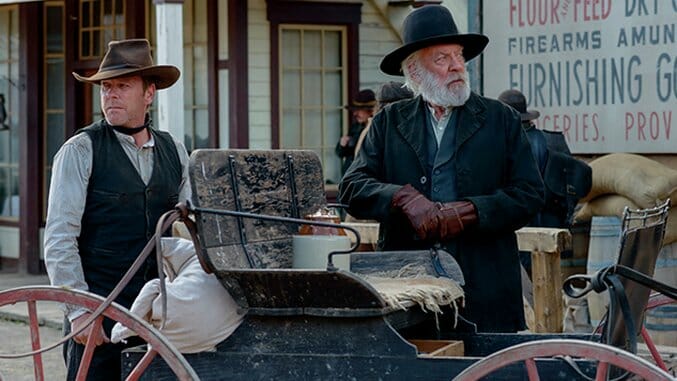Forsaken

When last we left Jack Bauer (Kiefer Sutherland) at the end of the recent 24 miniseries, Live Another Day, he had just given himself up to the Russians in order save the life of his steadfast super-techie sidekick Chloe (Mary Lynn Rajskub). Thus ended yet another round of guilt-ridden killings for the former CTU agent and now-current renegade, a man who has endured great personal costs—physical, moral and otherwise—to protect his country from harm.
So what does 24: Live Another Day have to do with Forsaken, beyond Sutherland being the star of both? For one thing, that miniseries and this film share both supporting actor Michael Wincott (the big bad in Live Another Day, a for-hire gunslinger here) and director Jon Cassar, a veteran 24 producer/executive producer who helmed half the segments of the 12-episode miniseries.
Beyond the shared personnel, though, the 24 connection offers an intriguing subtextual layer to Forsaken that gives Cassar’s film the only real interest it has. Make no mistake: As a Western, this is pretty generic stuff. Take the wannabe-retired gunslinger at the heart of Clint Eastwood’s Unforgiven and stick him into a Shane-like scenario, in which a town is menaced by a mustache-twirling group of land developers kicking townspeople out of their homes through brute force. That’s Forsaken in a nutshell, and outside of the tug-of-war between religious faith and agnostic doubt seen in the tension-filled dynamic between John Henry Clayton (Kiefer Sutherland) and his father, Rev. Clayton (played by Kiefer’s own father, Donald Sutherland)—a spiritual angle wholly absent from those aforementioned genre precursors—the film basically plays out in the manner you’d expect, rarely offering any genuine surprises along the way.
-

-

-

-

-

-

-

-

-

-

-

-

-

-

-

-

-

-

-

-

-

-

-

-

-

-

-

-

-

-

-

-

-

-

-

-

-

-

-

-








































